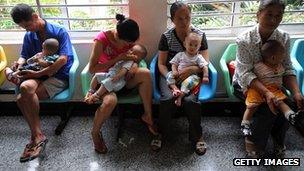China's Yili recalls mercury-tainted baby formula milk
- Published

The 2008 tainted milk scandal saw tens of thousands of babies poisoned in China
A major dairy firm in China has recalled some of its baby formula products after an "unusual" level of mercury was found by the country's product quality watchdog.
Tests carried out showed that only products from the Yili Group are contaminated.
The firm, based in the Inner Mongolia city of Hohhot, said it will investigate the cause of the problem.
A contamination by melamine in 2008 killed six babies and made 300,000 ill.
Among 715 infant formula product samples that have been examined so far, only batches from Yili are detected with "an unusual level" of mercury, said China's General Administration of Quality Supervision, Inspection and Quarantine (AQSIQ) in a statement on Thursday.
A spokesperson from the local quality supervision bureau in Inner Mongolia said that two samples from Yili were found with mercury concentration of 0.034mg/Kg and 0.045mg/kg.
High levels of mercury can cause damages to brain and kidneys.
Yili Group said on their website that the recall only applies to Quan You baby formula produced between November 2011 and May 2012. No problems are found in other products, it said.
The company also said in the statement that there is "no benchmark for mercury levels in milk powder products available from China and abroad".
Yili's recall takes place during China's "Food Safety Week" and a day after the cabinet introduced fresh measures to tighten food safety control.
The company, China's biggest milk producer by revenue, has seen its share prices fall below the 10% day limit in Shanghai on Friday, the Reuters news agency reported.
The 2008 scandal has caused a heavy blow to China's milk industry after a number of firms were found to be using the toxic chemical melamine.
Parents in mainland China have turned to imported baby formula in hope of better reliability, resulting in scarce supply in Hong Kong.
- Published7 May 2012
- Published22 January 2012
- Published11 April 2011
- Published1 February 2011
- Published15 August 2010